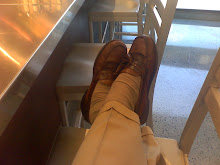Got a long message from a traddie in a galaxy far, far away taking exception to my post saying that Vatican II was the vehicle, not the cause, of our ruination. Interesting, so with the permission of Jacques, the author (not his real name), I'm posting much of it here, with a couple of comments he's since passed along:
Curmudgeon: * * * One demurrer, or perhaps slight exception to your V2 commentary. Simply put, to argue that V2 didn't cause the crisis, that it was latent (or in some cases, outright) before it occurred doesn't convince me.Let me give an analogy: before the French Revolution, plenty of ideas were bubbling up, many silly, many downright sinister. But it took a specific action--the convening of the Etats-General in 1789-- to set off definitively the chain of events that would lead to the catastrophes of the French Revolution. Most definitely the consequences of its convocation were dependent upon its convocation [Jacques here wants me to point out that the foregoing sentence makes no sense; he meant to say something like "...convocation were dependent upon its having been convened"]. In similar fashion, one can say, sure modernism existed before the Council. Sure the Church had fools, dupes, and others bearning Bugnini-like malice. But they existed as individuals; they were atomized. It took a climactic, epoch-making event to give their work both worldwide recognition and implied sanction (or at least, not downright condemnation) along with worldwide recognition from a progressive media.
Could the Church have weathered the social upheavals of the 60s, with no V2, and still have remained strong as She was? Don't know--that's a counterfactual. However, what I do know is that She HAS weathered social upheavals in past centuries. It's our temporal parochialism that causes us to think that the 60s were some decisive moment in the history of mankind. She came out of the Revolutionary era of the late 1800s and the Napoleonic era of the early 1900s [here, Jacques tells me he meant to say 1700s and 1800s, or 18th century and 19th century]--when churches were sacked, pillaged, and destroyed, when priests and nuns were guillotined, and when lay faithful were slaughtered on genocidal levels--stronger than before, to give just one instance.
So I don't really buy the argument that the Church was already in deep water pre-Council. Yes, there were serious problems; yes, Europe was already slowly apostasizing; yes, America was already being blatant in Americanist heretical inclinations (as historian John Lukacs points out, many far-right McCarthy supporting priests supported a vernacular liturgy, precisely so it would be more "American"). But the Church ALWAYS has problems like this, always has heresies and whatnot trying to tear away the seamless robe. What it has never had, in my admittedly amateurish estimation of it, was a Council that seemed to open the door for so much nonsense and tomfoolery in its ambiguities and Orwellian double-speak.
I'm not a Lefebvrist, though sympathetic to a lot of what the SSPX stands for (not all by the way, and I do get annoyed with the sanctimony and sectarianism of some of 'em), but * * * every bone in my historical body tells me that the Conciliar Fathers either had an abysmal understanding of history, were duped by Rahnerians, or were actively seeking the Church's auto-destruction. It was all a colossal folly--the whole event reeks of self-congratulation, of a new kind of triumphalism (as in, "How much smarter we are now!"), and of a blissful, blinkered optimism about human nature. That it occurred less than two decades after secular forces killed and tortured more human beings than at any comparable point in history, in the midst of a "cold war" in which one side routinely killed and tortured and imprisoned (and the other, that is, us, didn't exactly have a great track record either) shows a foolishness unparalleled in the history of Catholicism.
The Council Fathers had learned, seemingly, nothing about human beings, or had forgotten what they knew.So yes, I blame Vatican 2. I may have to accept it (or maybe I don't -- I'm confused on that one, but again, isn't that Vatican 2's fault that I don't know this?). In this case, post hoc ergo propter hoc, indeed.
Hmm. Very interesting.
Thursday, March 23, 2006
Subscribe to:
Post Comments (Atom)


No comments:
Post a Comment